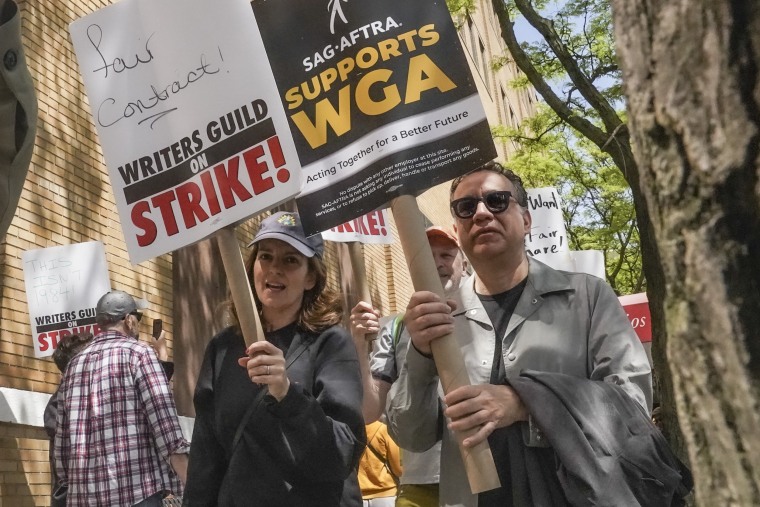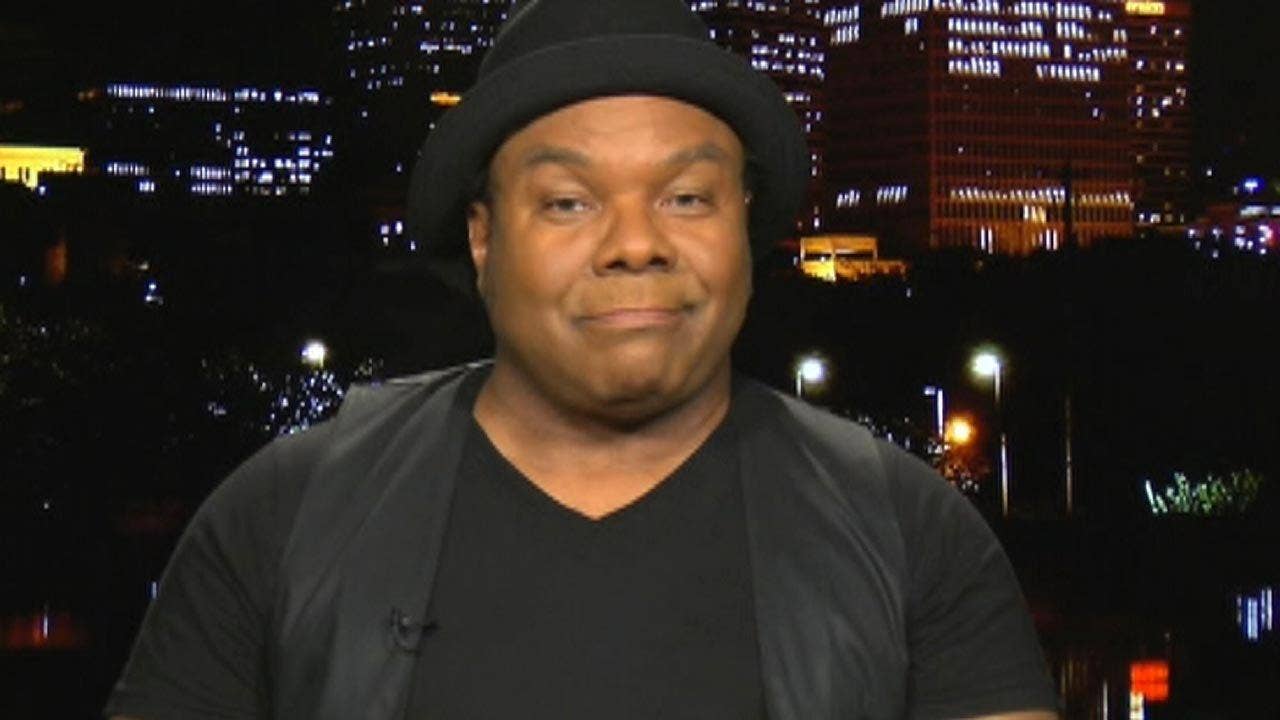Double Trouble In Hollywood: Actors' Strike Amplifies Writers' Walkout

Table of Contents
The Writers' Guild of America (WGA) Strike: The Genesis of the Hollywood Crisis
The WGA strike, which began in May 2023, served as the initial spark igniting the Hollywood powder keg. The strike, representing thousands of screenwriters, exposed long-simmering tensions between creatives and the major studios and streaming services.
Key Demands of the WGA:
The WGA's core demands center around several key issues crucial to the well-being of screenwriters:
- Fair wages and residuals, especially in the streaming era: The rise of streaming services has dramatically altered the compensation landscape for writers. Traditional models of residuals, payments based on repeated broadcasts, have been significantly diminished, leaving many writers struggling to make a living. The WGA is demanding a fairer share of streaming revenue.
- Stronger protections against the use of AI in writing and script generation: The increasing use of artificial intelligence in scriptwriting poses a significant threat to writers' livelihoods. The WGA seeks strong safeguards to prevent the replacement of human writers with AI.
- Increased transparency regarding viewership data: Streaming services often keep viewership data closely guarded. The WGA demands greater transparency to allow for fairer negotiations and compensation based on actual performance.
- Improved working conditions for writers: The WGA also seeks improvements in working conditions, including better minimum staffing levels on productions and protections against excessive working hours.
Bullet Points:
- Historically, writers' strikes have been infrequent but impactful, forcing major industry changes. The 2007-2008 WGA strike, for example, led to some improvements in compensation but didn't fully address the evolving challenges presented by streaming.
- The shift to streaming has significantly reduced residuals for writers, as traditional rerun fees are significantly lower or nonexistent on many platforms. This has created significant financial instability for many writers.
- The potential for AI to generate scripts autonomously is a major concern, threatening to displace human writers and further depress wages.
- The WGA strike has resulted in a significant slowdown in television production, with many shows delayed or canceled.
SAG-AFTRA Joins the Fight: Actors' Strike Intensifies the Crisis
The Screen Actors Guild - American Federation of Television and Radio Artists (SAG-AFTRA) joined the picket lines in July 2023, significantly escalating the Hollywood strike. This unified front of writers and actors represents an unprecedented show of solidarity and power.
SAG-AFTRA's Grievances:
SAG-AFTRA's concerns largely mirror those of the WGA, focusing on fair compensation and the impact of emerging technologies. Specific grievances include:
- Fair wages and residuals, particularly concerning streaming revenue: Actors, like writers, have seen a decrease in residuals due to the rise of streaming. The union is demanding a fairer share of the profits generated by streaming platforms.
- Concerns about the use of AI in creating digital replicas of actors: The use of AI to create digital likenesses of actors without their consent or compensation is a major concern. The union seeks robust protections against this exploitative practice.
- Protection against self-tape auditions and the erosion of working conditions: The increasing reliance on self-tape auditions has eroded working conditions and reduced the opportunities for actors. SAG-AFTRA is pushing for better protections and working conditions.
Bullet Points:
- SAG-AFTRA's participation in the strike dramatically increases its impact, bringing nearly all aspects of film and television production to a halt.
- Both writers and actors share concerns regarding fair compensation in the streaming era and the ethical implications of AI in entertainment.
- The actors' strike has brought major film and television productions to a standstill, delaying numerous projects and impacting release schedules.
- The impact on award shows like the Emmys and upcoming film releases is significant, potentially leading to postponement or cancellations.
The Ripple Effect: Economic and Cultural Consequences of the Double Strike
The combined WGA and SAG-AFTRA strikes have created a significant ripple effect throughout the entertainment industry and beyond.
Economic Impacts:
- Loss of revenue for studios and streaming services: The production standstill is causing massive losses for studios and streaming services, impacting their bottom lines significantly.
- Job losses for crew members and other industry professionals: Thousands of crew members, including camera operators, editors, and production assistants, are facing unemployment due to the shutdown.
- Negative impact on local economies reliant on film and television production: Many cities and regions rely heavily on film and television production for economic growth. The strikes are negatively impacting these local economies.
Cultural Impacts:
- Delays in the release of anticipated films and television shows: The strikes are causing significant delays in the release of numerous high-profile projects.
- Reduced content diversity due to production halts: The prolonged shutdown is likely to reduce the diversity of content available to audiences.
- Potential shift in the power dynamics between studios and creatives: The strikes could potentially lead to a renegotiation of power dynamics within the industry, giving creatives a stronger voice in future negotiations.
Bullet Points:
- The economic impact extends far beyond the studios and directly affects numerous smaller businesses and individuals who support the industry.
- The long-term effects on the entertainment industry remain uncertain, but could include changes in production models and compensation structures.
- The potential for these strikes to spur significant industry-wide reform is high, pushing for better working conditions and fair compensation for all creatives.
Conclusion
The simultaneous strikes by the WGA and SAG-AFTRA represent a seismic event in Hollywood, highlighting critical issues surrounding fair compensation, the impact of streaming services and AI, and the overall working conditions for creative professionals. The combined power of these strikes has brought the industry to a standstill, with potentially far-reaching consequences.
Call to Action: Understanding the complexities of the Hollywood strike and its implications is crucial for anyone interested in the future of the entertainment industry. Stay informed about the developments in the actors' strike and writers' strike to understand the ongoing negotiations and the potential long-term effects of this unprecedented double trouble in Hollywood. Learn more about the key issues driving the actors' strike and writers' strike to understand the potential for lasting change.

Featured Posts
-
 Orange County Teams Scores And Player Stats March 11th
May 31, 2025
Orange County Teams Scores And Player Stats March 11th
May 31, 2025 -
 Madrid Open 2024 Berrettini Loses To Giron Despite Comeback Attempt
May 31, 2025
Madrid Open 2024 Berrettini Loses To Giron Despite Comeback Attempt
May 31, 2025 -
 Team Victorious Previewing Their Tour Of The Alps Campaign
May 31, 2025
Team Victorious Previewing Their Tour Of The Alps Campaign
May 31, 2025 -
 March 26th 2016 The Day Prince Died Fentanyl Levels Confirmed
May 31, 2025
March 26th 2016 The Day Prince Died Fentanyl Levels Confirmed
May 31, 2025 -
 Achieving The Good Life Strategies For Wellbeing
May 31, 2025
Achieving The Good Life Strategies For Wellbeing
May 31, 2025
